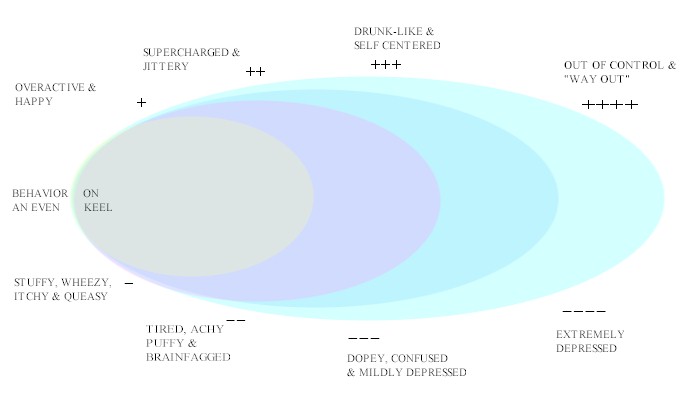Food Addiction and Ecologic Mental Illness
by
Theron G. Randolph, MD
Foods eaten frequently and regularly are rarely ever suspected as offenders. Persons addicted to common foods simply use them as often as necessary to keep well. In other words, "hooked" (specifically addicted) persons eat or drink their favorite "pick-ups" (food mixtures or primary foods) in order to remain "picked-up" (stimmulated) and to pospone or treat their "hangovers" (withdrawal effects). Increasing individual susceptibility, progressivly monotonous diets, and advancing chronic illnesses occur concomitantly.
If food addictants are sensed as stimulants and are eaten regularly, obesity, alcoholism, hyperactivity, insomnia, nervousness, and/or anxiety tend to develop, or persons may become self-centered, excited, aggressive, and agitated.
But if food offenders are not eaten regularly, early morning and premeal accentuations of localized or systemic allergies tend to occur, and, somewhat later, such persons tend to become "neurotic" or "psychotic." These developments, often called the "onset" of the present illness, usually prompt persons so affected to seek medical help.
Especially in the presence of developing individual susceptibility to chemical environmental exposures, addictive responses may also develop to prescribed or self-medicated drugs and/or chemical additives and contaminants of air, food, and water.
THE UPS AND DOWNS OF ADDICTED LIFE
"PICK - UPS"

"HANGOVERS"
START AT THE CENTER LEFT, FOLLOW CLOCKWISE, INDUCED REACTIONS MAY REACH ANY "PICK-UP" LEVEL BEFORE MERGING WITH THE APPROXIMATELY CORRESPONDING "HANGOVER" BEFORE RECEDING.
This above material was taken with permission from a presentation by Dr. Randolph with two of his colleagues at the Fifth World Congress of Psychiatry in Mexico City in 1971.
Article from NOHA NEWS, Vol. XII, No. 2, Spring 1987, page 2.